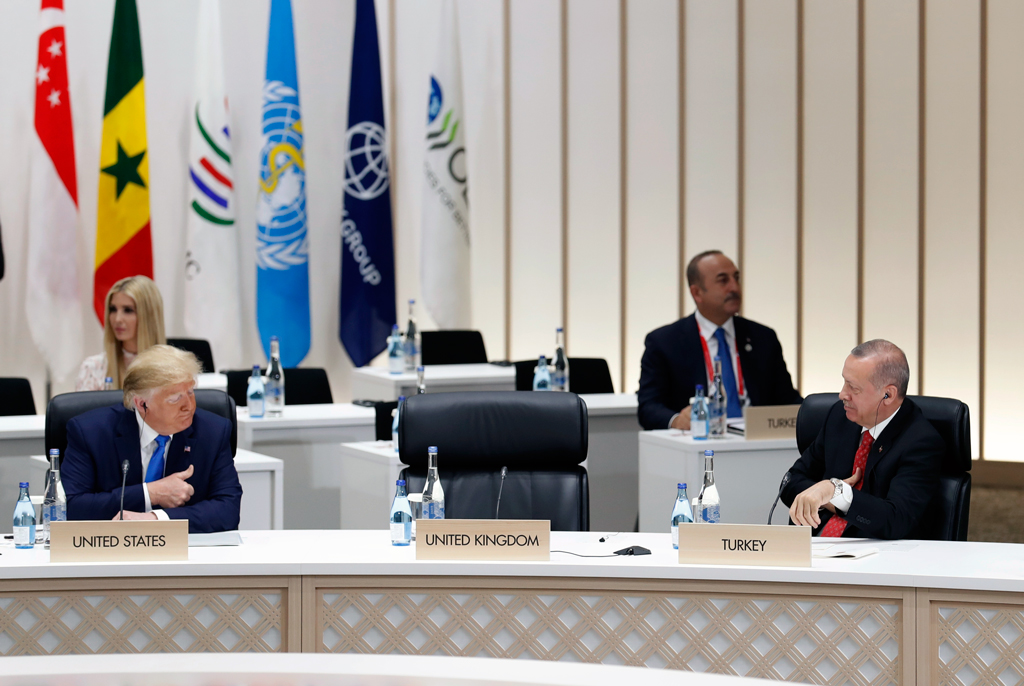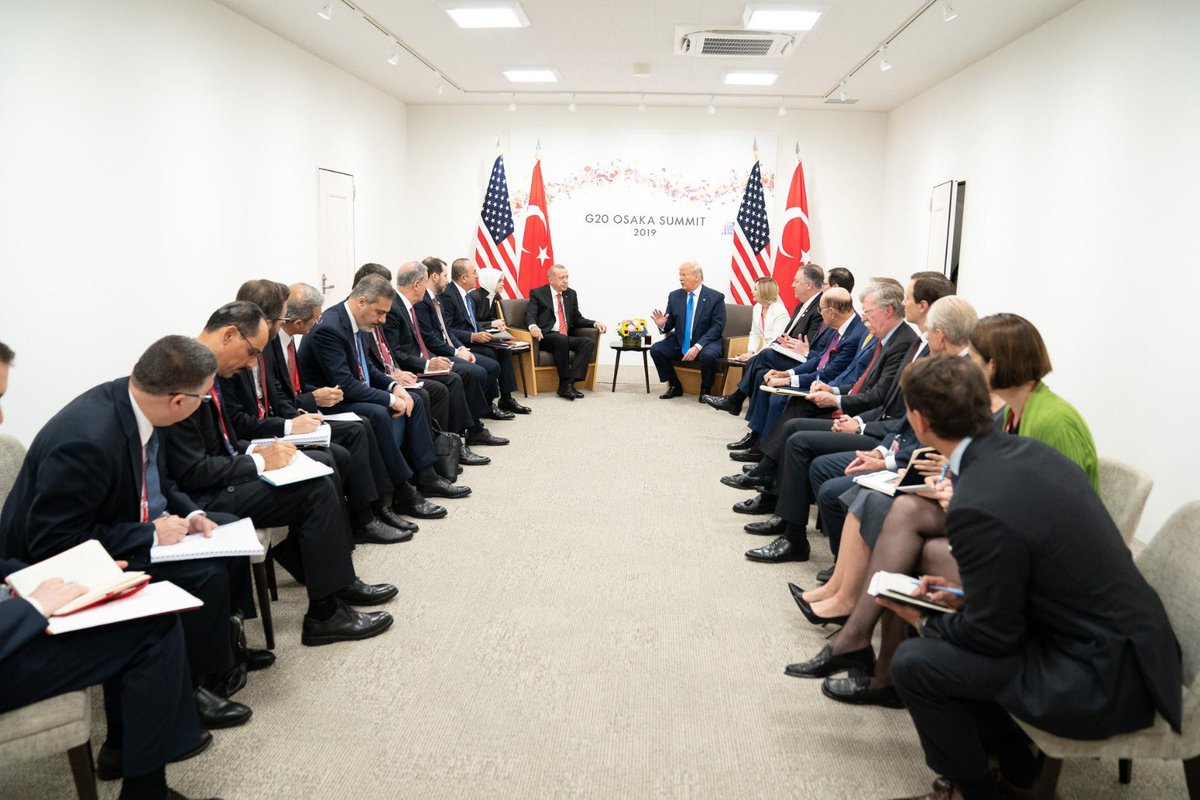Pesident Recep Tayyip Erdoğan's bilateral meeting with U.S. President Donald Trump in Osaka, Japan marked a new chapter in the S-400 dispute. A textbook example of leader-to-leader diplomacy, that meeting paved the way for Trump lending support to the Turkish position on Patriot missiles, the Russian air defense system and the F-35 jet fighter program.
The U.S. president went further, acknowledging that his Turkish counterpart had been treated unfairly. Trump's warm attitude toward the Turkish delegation, too, established that he disagreed with his policy team on Turkey. The U.S. president is expected to visit Turkey in the near future. Let us recall that Trump has never told Erdoğan that he intended to impose sanctions against Turkey.
In light of the bilateral meeting in Japan, is it possible to conclude that a serious train wreck has been averted? When it comes to the U.S., I prefer to exercise cautious optimism – even when things are going well. Until the Osaka meeting, U.S. officials repeatedly warned that sanctions were "unavoidable" and argued that Trump had no power over Congress. In Japan, however, the U.S. president expressed his sympathy for Erdoğan and refuted his own bureaucracy's arguments.
This was indeed a very positive development. First of all, we heard straight from the horse's mouth that Turkey's move to purchase the S-400 system was not a NATO crisis. Trump also took the initiative on Washington's policy on Turkey, noting that the Obama administration was to blame for the current situation and discrediting any future move by the Congress.
[caption id="attachment_11789" align="aligncenter" width="1024"] Turkish President Recep Tayyip Erdogan (R) and U.S President Donald Trump (L) attend the third session of the G20 Summit on the second day at INTEX Osaka Exhibition Center in Osaka, Japan on June 29, 2019.[/caption]
Coming from a trigger-happy president when it comes to economic sanctions, Trump's remarks on the Turkish president being treated unfairly bore importance for domestic politics as well. No longer can the Turkish opposition reject the govern
ment's claim that Turkey needs the S-400 system to defend itself. In other words, the S-400 deal is now considered a matter of national interest.
Still, we have every reason to expect Congress and the U.S. bureaucracy to undermine Trump's position. There is a good chance that Congress will impose the Countering America's Adversaries Through Sanctions Act (CAATSA) on Turkey if Russia delivers the S-400 system to Turkey in the coming days. Ahead of the U.S. presidential election, it remains critically important how Trump will respond.
It is no secret that the U.S. president is not a fan of CAATSA, which limits executive power. He could delay sanctions for 180 days, implement just five of the 12 sanctions or exercise presidential powers. Congress could mount pressure on the White House, and Trump could push back.
If Trump takes matters into his own hands, as he did with Saudi Arabia, the S-400 dispute could go away. In addition to averting a train wreck, the U.S. president could thus facilitate closer cooperation between Turkey and the U.S. on the proposed safe zone in northern Syria and the situation in Manbij.
Just as the U.S. bureaucracy started talking about repairing bilateral relations after the seemingly inevitable train wreck over Turkey's move to buy the S-400 system, Trump came up with a game changer.
Now is the time for anyone in Washington who believes that the U.S. has been too tough on Turkey to speak up. President Trump must not be left alone at this critical junction. Turkey must cease to be a partisan issue to ensure that we do not miss this opportunity.
The exceptional leader-to-leader diplomacy between Erdoğan and Trump should usher in a new era in Turkey-U.S. relations. The U.S. government must acknowledge that the relationship has been overly strained since 2013.
Turkish President Recep Tayyip Erdogan (R) and U.S President Donald Trump (L) attend the third session of the G20 Summit on the second day at INTEX Osaka Exhibition Center in Osaka, Japan on June 29, 2019.[/caption]
Coming from a trigger-happy president when it comes to economic sanctions, Trump's remarks on the Turkish president being treated unfairly bore importance for domestic politics as well. No longer can the Turkish opposition reject the govern
ment's claim that Turkey needs the S-400 system to defend itself. In other words, the S-400 deal is now considered a matter of national interest.
Still, we have every reason to expect Congress and the U.S. bureaucracy to undermine Trump's position. There is a good chance that Congress will impose the Countering America's Adversaries Through Sanctions Act (CAATSA) on Turkey if Russia delivers the S-400 system to Turkey in the coming days. Ahead of the U.S. presidential election, it remains critically important how Trump will respond.
It is no secret that the U.S. president is not a fan of CAATSA, which limits executive power. He could delay sanctions for 180 days, implement just five of the 12 sanctions or exercise presidential powers. Congress could mount pressure on the White House, and Trump could push back.
If Trump takes matters into his own hands, as he did with Saudi Arabia, the S-400 dispute could go away. In addition to averting a train wreck, the U.S. president could thus facilitate closer cooperation between Turkey and the U.S. on the proposed safe zone in northern Syria and the situation in Manbij.
Just as the U.S. bureaucracy started talking about repairing bilateral relations after the seemingly inevitable train wreck over Turkey's move to buy the S-400 system, Trump came up with a game changer.
Now is the time for anyone in Washington who believes that the U.S. has been too tough on Turkey to speak up. President Trump must not be left alone at this critical junction. Turkey must cease to be a partisan issue to ensure that we do not miss this opportunity.
The exceptional leader-to-leader diplomacy between Erdoğan and Trump should usher in a new era in Turkey-U.S. relations. The U.S. government must acknowledge that the relationship has been overly strained since 2013.
[Daily Sabah, 3 July 2019]
 Turkish President Recep Tayyip Erdogan (R) and U.S President Donald Trump (L) attend the third session of the G20 Summit on the second day at INTEX Osaka Exhibition Center in Osaka, Japan on June 29, 2019.[/caption]
Coming from a trigger-happy president when it comes to economic sanctions, Trump's remarks on the Turkish president being treated unfairly bore importance for domestic politics as well. No longer can the Turkish opposition reject the govern
ment's claim that Turkey needs the S-400 system to defend itself. In other words, the S-400 deal is now considered a matter of national interest.
Still, we have every reason to expect Congress and the U.S. bureaucracy to undermine Trump's position. There is a good chance that Congress will impose the Countering America's Adversaries Through Sanctions Act (CAATSA) on Turkey if Russia delivers the S-400 system to Turkey in the coming days. Ahead of the U.S. presidential election, it remains critically important how Trump will respond.
It is no secret that the U.S. president is not a fan of CAATSA, which limits executive power. He could delay sanctions for 180 days, implement just five of the 12 sanctions or exercise presidential powers. Congress could mount pressure on the White House, and Trump could push back.
If Trump takes matters into his own hands, as he did with Saudi Arabia, the S-400 dispute could go away. In addition to averting a train wreck, the U.S. president could thus facilitate closer cooperation between Turkey and the U.S. on the proposed safe zone in northern Syria and the situation in Manbij.
Just as the U.S. bureaucracy started talking about repairing bilateral relations after the seemingly inevitable train wreck over Turkey's move to buy the S-400 system, Trump came up with a game changer.
Now is the time for anyone in Washington who believes that the U.S. has been too tough on Turkey to speak up. President Trump must not be left alone at this critical junction. Turkey must cease to be a partisan issue to ensure that we do not miss this opportunity.
The exceptional leader-to-leader diplomacy between Erdoğan and Trump should usher in a new era in Turkey-U.S. relations. The U.S. government must acknowledge that the relationship has been overly strained since 2013.
Turkish President Recep Tayyip Erdogan (R) and U.S President Donald Trump (L) attend the third session of the G20 Summit on the second day at INTEX Osaka Exhibition Center in Osaka, Japan on June 29, 2019.[/caption]
Coming from a trigger-happy president when it comes to economic sanctions, Trump's remarks on the Turkish president being treated unfairly bore importance for domestic politics as well. No longer can the Turkish opposition reject the govern
ment's claim that Turkey needs the S-400 system to defend itself. In other words, the S-400 deal is now considered a matter of national interest.
Still, we have every reason to expect Congress and the U.S. bureaucracy to undermine Trump's position. There is a good chance that Congress will impose the Countering America's Adversaries Through Sanctions Act (CAATSA) on Turkey if Russia delivers the S-400 system to Turkey in the coming days. Ahead of the U.S. presidential election, it remains critically important how Trump will respond.
It is no secret that the U.S. president is not a fan of CAATSA, which limits executive power. He could delay sanctions for 180 days, implement just five of the 12 sanctions or exercise presidential powers. Congress could mount pressure on the White House, and Trump could push back.
If Trump takes matters into his own hands, as he did with Saudi Arabia, the S-400 dispute could go away. In addition to averting a train wreck, the U.S. president could thus facilitate closer cooperation between Turkey and the U.S. on the proposed safe zone in northern Syria and the situation in Manbij.
Just as the U.S. bureaucracy started talking about repairing bilateral relations after the seemingly inevitable train wreck over Turkey's move to buy the S-400 system, Trump came up with a game changer.
Now is the time for anyone in Washington who believes that the U.S. has been too tough on Turkey to speak up. President Trump must not be left alone at this critical junction. Turkey must cease to be a partisan issue to ensure that we do not miss this opportunity.
The exceptional leader-to-leader diplomacy between Erdoğan and Trump should usher in a new era in Turkey-U.S. relations. The U.S. government must acknowledge that the relationship has been overly strained since 2013.







